In today’s fast-paced digital world, finding the right B2B ecommerce platform is essential for businesses aiming to optimize operations and expand their reach. With a variety of options available, from highly customizable platforms to those with seamless integrations, it’s easy to feel overwhelmed by choices. This guide breaks down the top B2B ecommerce platforms, highlighting each option’s unique strengths to help you make an informed decision quickly and confidently.
Whether you’re a growing enterprise or an established business looking to optimize online sales, this article will guide you through platforms that can boost your sales efficiency and offer a seamless purchasing experience for your clients. Explore these options and find the ideal B2B ecommerce platform to elevate your business and stay ahead of the competition.

Create your online store in minutes!
Looking to sell online? Develop and launch your store with 10Web AI Ecommerce Website Builder.
9 Best B2B ecommerce platforms
B2B ecommerce platforms are changing how companies do business with each other online. These tools let businesses sell products and services to other businesses through websites and apps. They make it easier to manage orders, track inventory, and handle payments.
B2B ecommerce platforms can help companies reach more customers and boost sales. They offer features like custom pricing, bulk ordering, and account management that regular online stores don’t have. Many businesses are now using these platforms to grow and stay competitive in the digital marketplace.
We’ve got 9 of the best B2B ecommerce platforms lined up, with insights and an overview of what makes them tick.
Shopify Plus
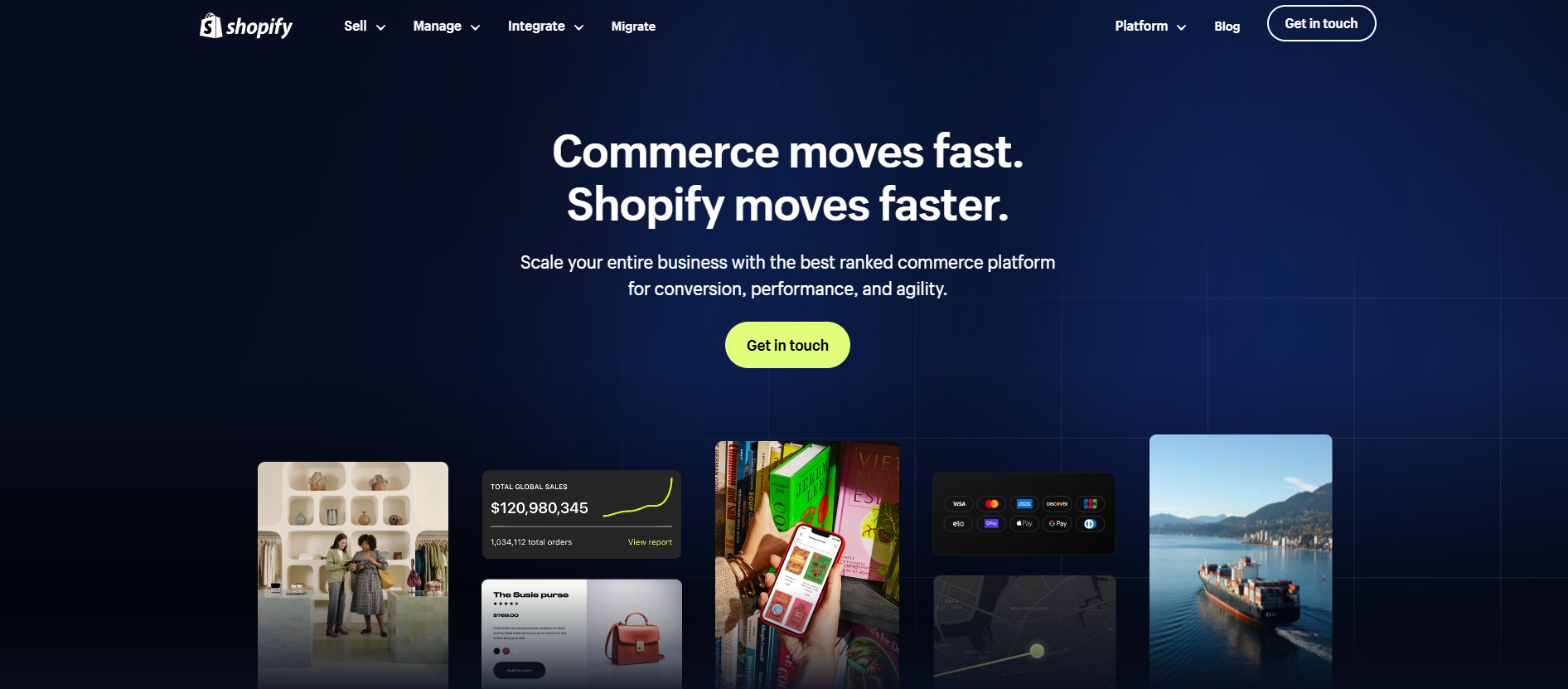
Shopify Plus is a powerful ecommerce platform designed for high-growth businesses. It offers advanced features to help you scale your online store and manage B2B operations efficiently.
With Shopify Plus, you can customize your storefront using APIs and create a unique shopping experience for your customers. The platform allows you to tailor your business solutions and add custom data to meet your specific needs.
You’ll find tools to streamline your B2B processes, which can save you time and help you grow faster. The platform integrates with various systems like ERPs and order management software, making it easier to run your business.
Shopify Plus gives you flexibility in development. You can work on different parts of your store at the same time and use any programming language you prefer. This can speed up your development process and help you launch changes quickly.
The platform also provides sandbox environments where you can test new features before making them live. This helps you ensure everything works smoothly before your customers see it.
Pricing for Shopify Plus starts higher than basic Shopify plans, reflecting its advanced features. It’s best suited for businesses making between $1 million and $500 million in annual revenue.
| Pros | Cons |
| Advanced customization options | Higher price point |
| B2B and wholesale features | May be too complex for small businesses |
| Good for growing businesses | Requires technical knowledge for full utilization |
| Scalable for high-growth businesses |
BigCommerce Enterprise
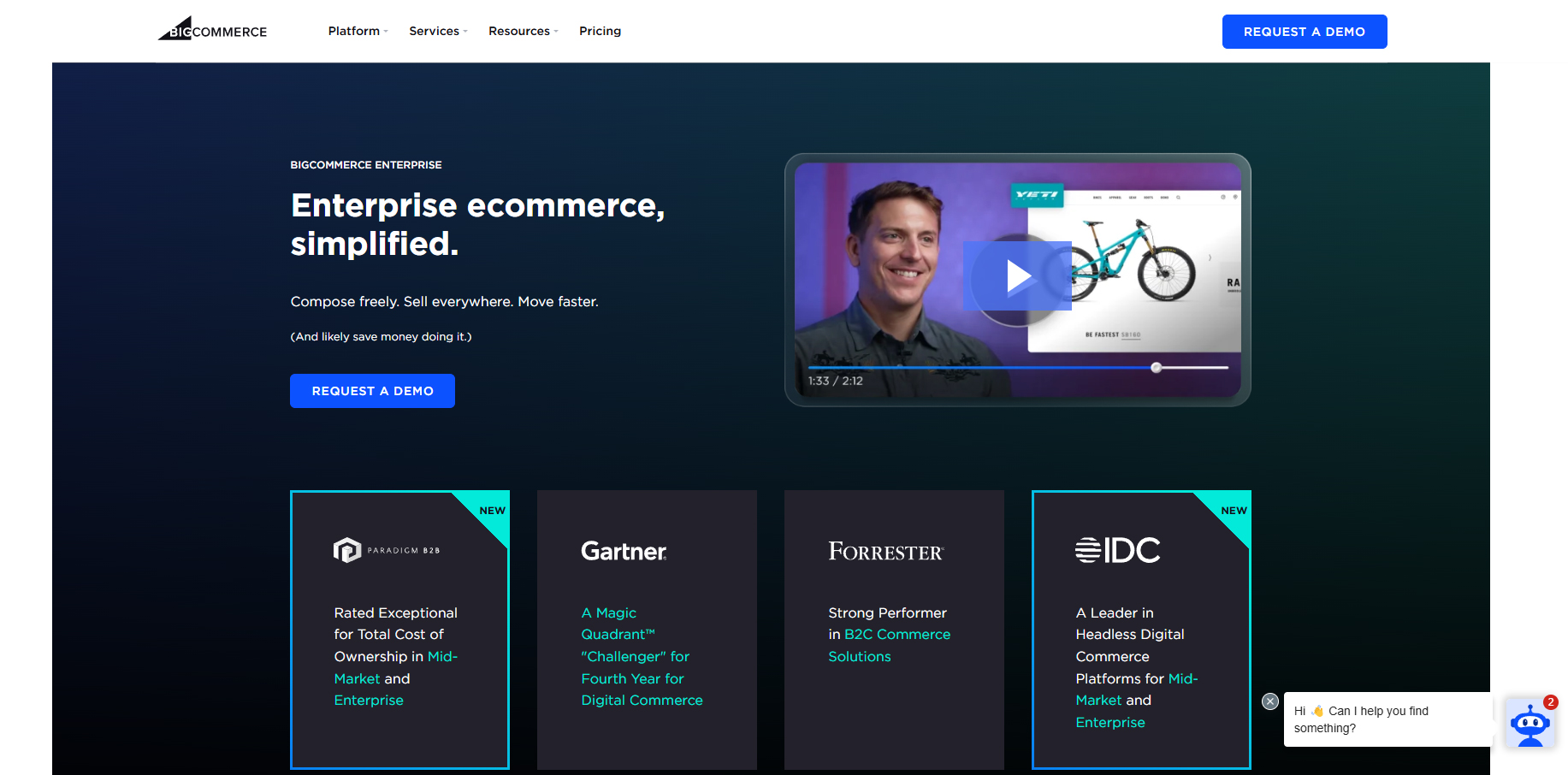
BigCommerce offers a powerful enterprise ecommerce platform for large businesses. You can create online stores with many features to meet your needs. The platform lets you manage multiple storefronts from one place.
BigCommerce gives you tools to handle B2B and B2C sales. You can set up custom pricing and catalogs for different customer groups. The platform also supports in-store pickup options.
You’ll find BigCommerce easy to use, even for complex enterprise needs. It has open APIs that let you connect with other business systems. This flexibility helps you build a custom commerce setup.
Pricing for BigCommerce enterprise plans is custom. You’ll need to contact them for a quote based on your business size and needs.
| Pros | Cons |
| Flexible APIs | Custom pricing |
| Multi-storefront management | May be complex for smaller businesses |
| Good for growing businesses |
BigCommerce works well for large companies that need a scalable ecommerce platform. It’s a good fit if you want to manage multiple stores or have both B2B and B2C sales.
Magento Commerce
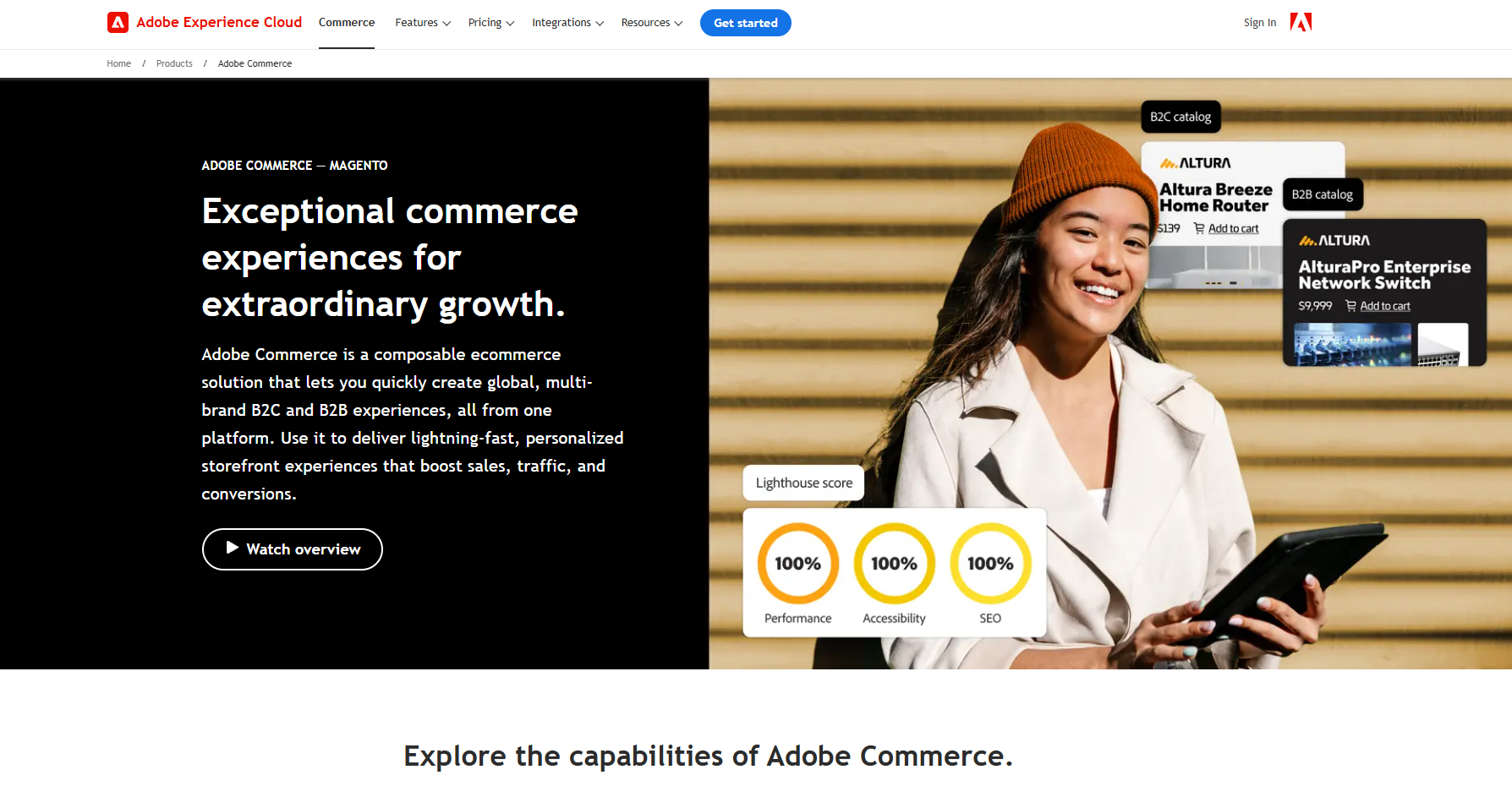
Magento Commerce, now called Adobe Commerce, is a popular ecommerce platform. It offers tools for both B2B and B2C businesses to create online stores. You can use it to build custom websites that fit your brand.
Adobe Commerce lets you manage multiple stores from one place. This saves time if you run several brands. The platform also helps you personalize the shopping experience for customers.
You might like Adobe Commerce for its flexibility. It works well for small shops and big companies. The platform can handle lots of products and orders.
Some users find it difficult to set up Adobe Commerce. You may need tech skills or help from experts to use all its features. The platform can also be pricey for smaller businesses.
Adobe Commerce costs vary based on your needs. Prices start at around $22,000 per year for the cloud version. Custom plans are available for larger companies.
This platform stands out for its B2B features. It offers tools like custom catalogs and pricing for business customers. These make it a good choice if you sell to other companies.
Adobe Commerce fits best for mid-size to large businesses. It’s ideal if you want a flexible system that can grow with your company. The platform works well for those selling both to consumers and other businesses.
| Pros | Cons |
| Flexible and customizable | Can be complex to set up |
| Good for B2B and B2C | Expensive for small businesses |
| Handles high volume | May require technical expertise |
10Web
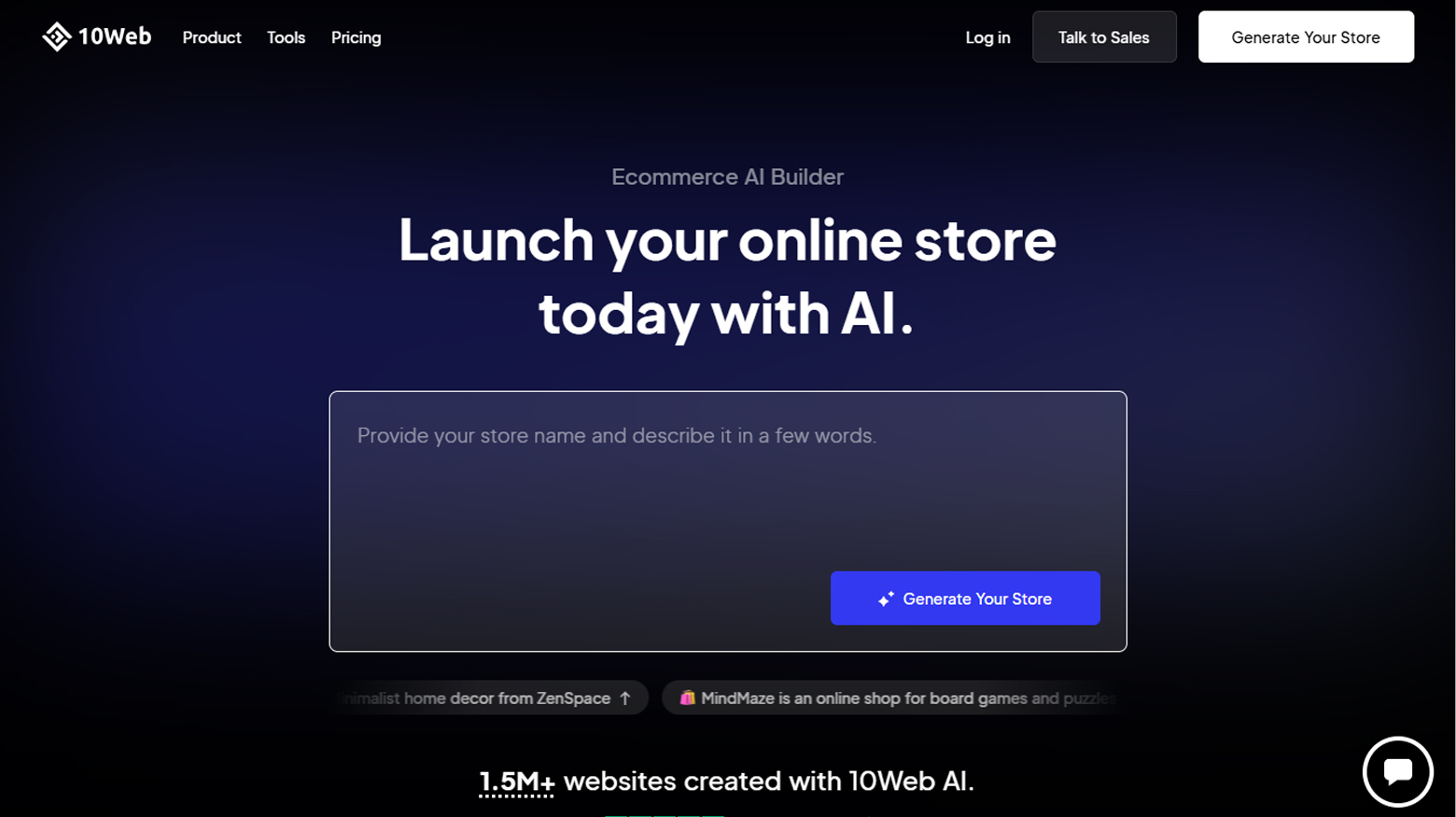
10Web offers a powerful suite of tools for creating B2B ecommerce platforms. Their AI Ecommerce Website Builder is designed to help businesses establish professional online storefronts tailored to B2B audiences. The AI Builder uses information you provide to automatically generate your editable ecommerce site along with it’s SEO optimized content. With 10Web’s all in one solution, you can easily build, customize, and launch your ecommerce store within hours.
The platform has integrated WooCommerce, providing flexibility for your online store and easy management of WooCommerce tools and features straight from their user friendly dashboard.
Another very important tool is 10Web’s Booster. The Booster optimizes your site’s performance using multiple optimization techniques , helping ensure fast loading times and improved user experience. This can be crucial for B2B buyers who need quick access to product information and ordering capabilities.
10Web stands out for its ease of use approach, making it a good choice for entrepreneurs and small business owners new to ecommerce. You won’t need extensive technical skills to get your B2B store up and running. For the amount of tools and features offered, 10Web has decent pricing starting at just $11 for their ecommerce starter plan.
| Pros | Cons |
| AI-powered website builder | May lack some advanced B2B features |
| WooCommerce integration | Limited to WordPress |
| Performance optimization tools |
We chose 10Web for its combination of ease of use and powerful features that cater to B2B needs. It’s best for small to medium-sized businesses looking to establish or upgrade their B2B ecommerce presence without dealing with complex technical setups.
Salesforce Commerce Cloud
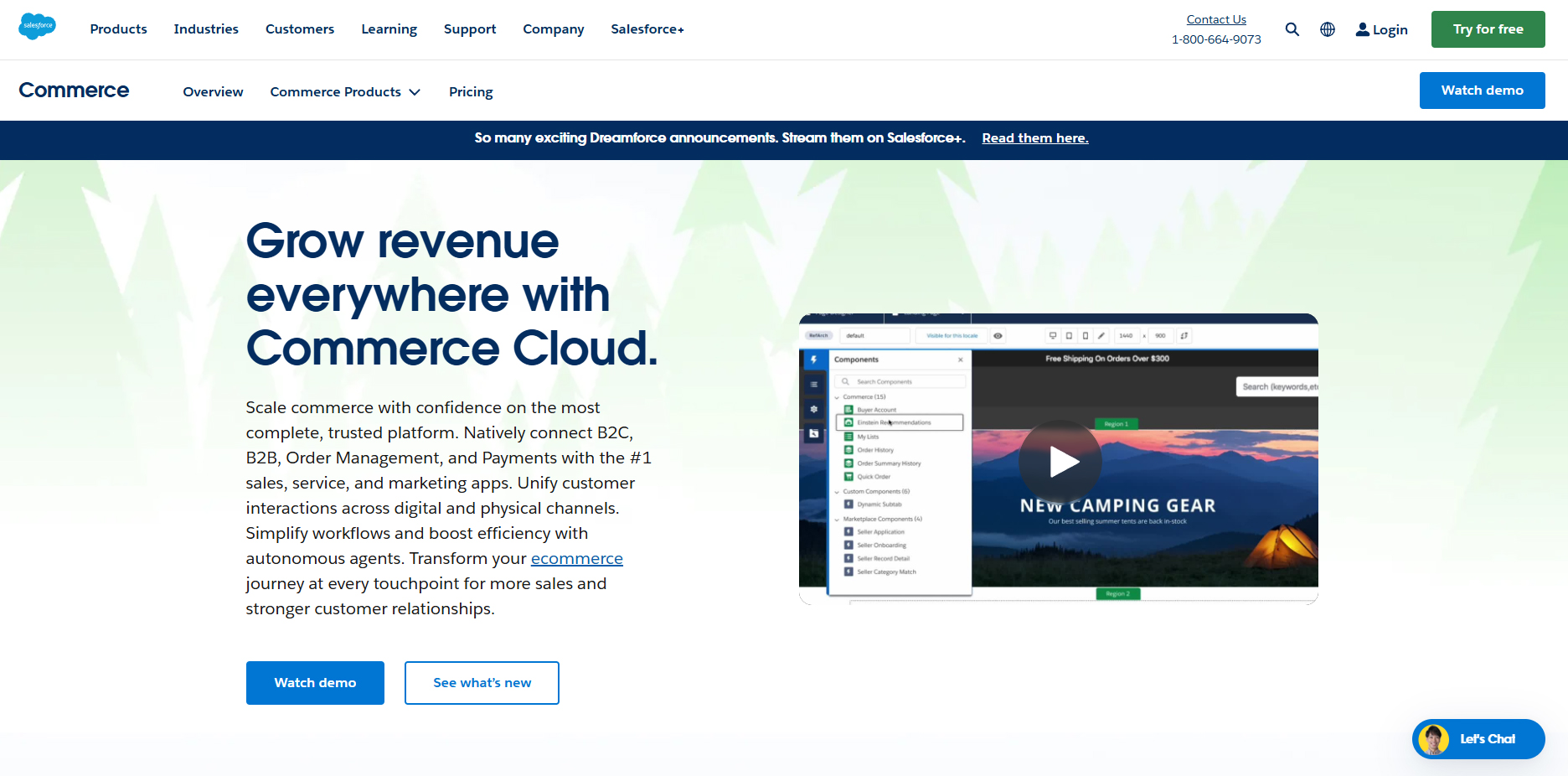
Salesforce Commerce Cloud is a powerful ecommerce platform that helps businesses sell products online. It’s part of Salesforce’s larger suite of customer relationship management tools.
Commerce Cloud offers solutions for both B2B and B2C companies. You can use it to create online stores, manage orders, and connect with customers across different channels.
The platform lets you build custom storefronts quickly. You can add features like account-based pricing for B2B customers or personalized product recommendations for shoppers.
One big advantage is how Commerce Cloud integrates with other Salesforce products. This means you can easily connect your online store with sales, marketing, and customer service tools.
Commerce Cloud also helps streamline order management. You can manage inventory, process payments, and handle shipping from one system.
| Pros | Cons |
| Integrates with other Salesforce tools | Can be complex for small businesses |
| Supports both B2B and B2C commerce | May be expensive for some companies |
| Offers personalization features | Requires technical know-how to set up |
Pricing for Commerce Cloud varies based on your business size and needs. You’ll need to contact Salesforce for a custom quote.
WooCommerce for B2B
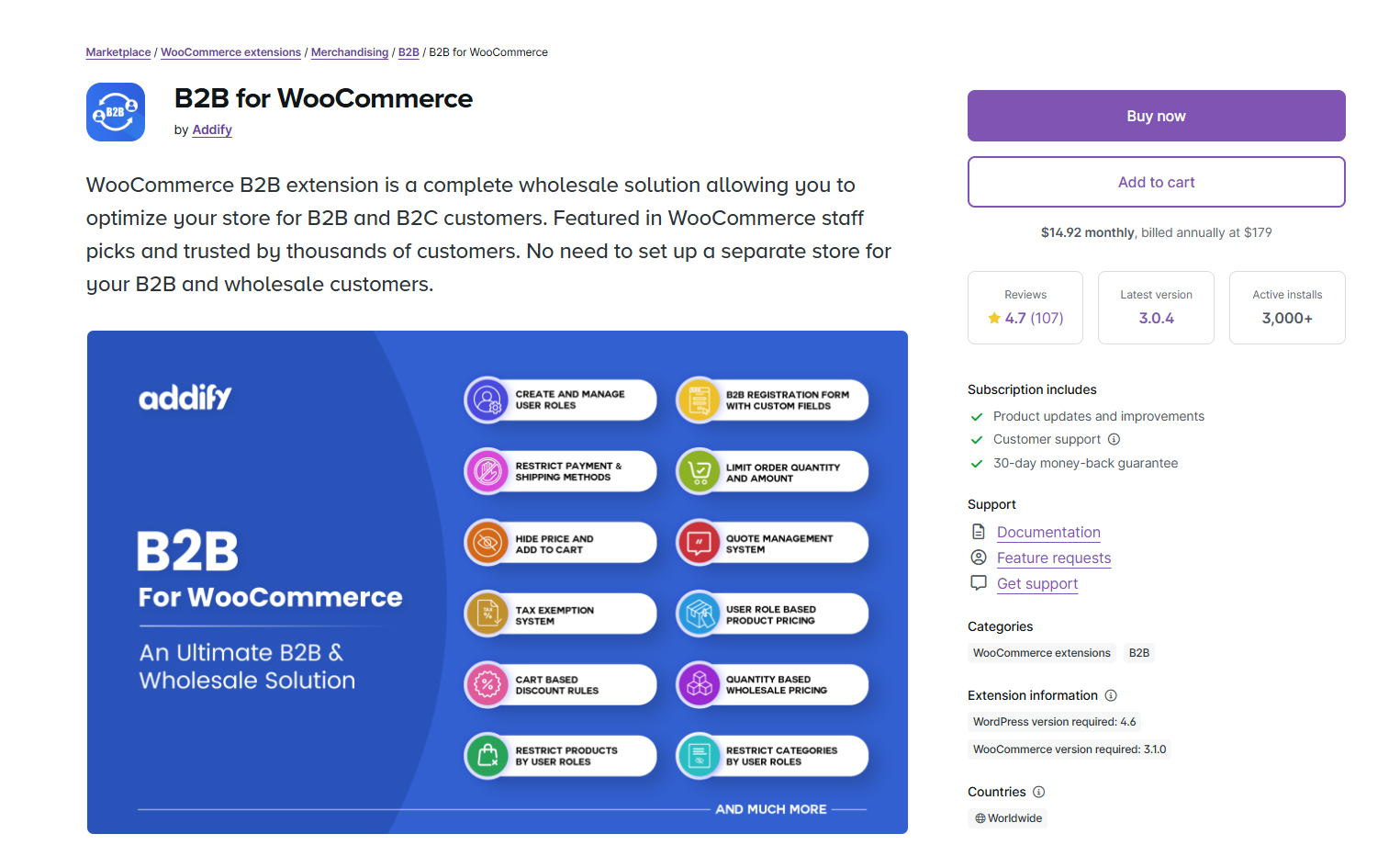
WooCommerce offers a powerful solution for businesses looking to set up a B2B ecommerce store. This popular platform lets you create a site that caters to both B2B and B2C customers.
With WooCommerce, you can set up custom pricing for different customer groups. This feature allows you to offer wholesale prices to your business clients while keeping retail prices for individual shoppers.
You can also control catalog visibility, showing certain products only to specific user roles. This helps you tailor the shopping experience for each type of customer.
WooCommerce supports minimum order quantities, which is useful for B2B sales. You can set rules to ensure business customers meet your wholesale requirements.
The platform integrates with many B2B-focused plugins. These add-ons can enhance your store with features like quote requests, bulk ordering, and customer-specific catalogs.
WooCommerce’s flexibility is a big plus for B2B stores. You can customize the checkout process, add business-specific fields, and create a unique look for your site.
| Pros | Cons |
| Supports both B2B and B2C sales | May require additional plugins for full B2B functionality |
| Custom pricing options | Can be complex to set up for beginners |
| Flexible and customizable | Might need developer help for advanced features |

Create your online store in minutes!
Looking to sell online? Develop and launch your store with 10Web AI Ecommerce Website Builder.
Oracle CX Commerce
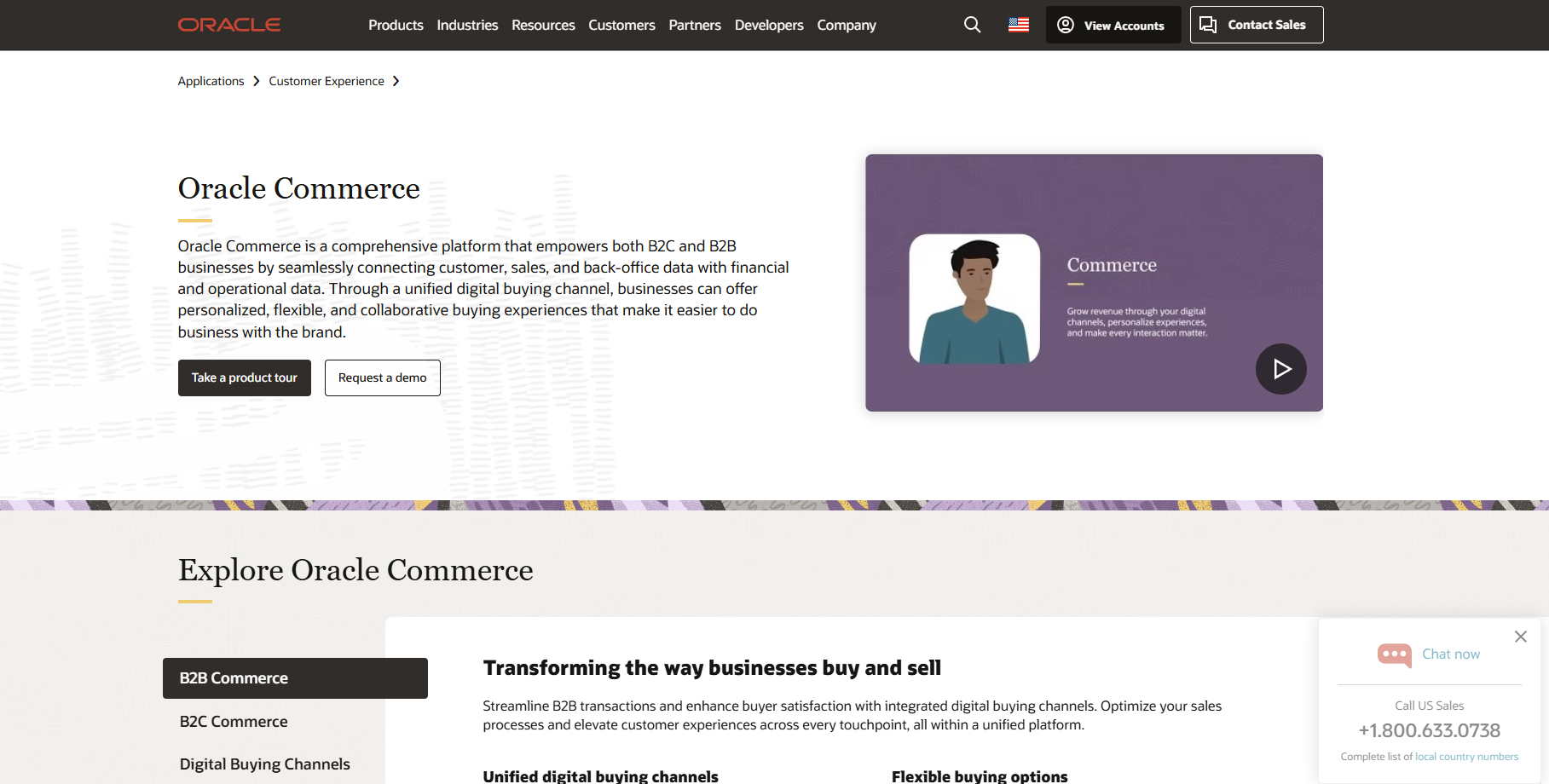
Oracle CX Commerce is a cloud-based platform for B2B and B2C ecommerce. It connects customer, sales, and back-office data to create personalized buying experiences. You can use it to build flexible online storefronts and reach new customers.
The platform offers tools to create customized ecommerce sites quickly. It handles the technical infrastructure, letting you focus on growing your business. Oracle manages updates and maintenance, saving you time and resources.
You get features for both B2C and B2B selling in one system. This means you can serve different customer types without needing separate platforms. The service adapts to complex B2B sales processes and business models.
| Pros | Cons |
| Unified B2B and B2C capabilities | May be complex for very small businesses |
| Cloud-based for easy updates | Pricing not publicly available |
| Customizable storefront options | Learning curve for new users |
Oracle CX Commerce works well for medium to large businesses needing a flexible ecommerce solution. Its scalability suits companies planning for growth. The platform’s B2B features make it a good fit for manufacturers and wholesalers.
Pricing isn’t public, but expect enterprise-level costs. Oracle chose this approach to provide a complete ecommerce package. You get the tools to create unique online experiences that can help increase sales.
SAP Commerce Cloud
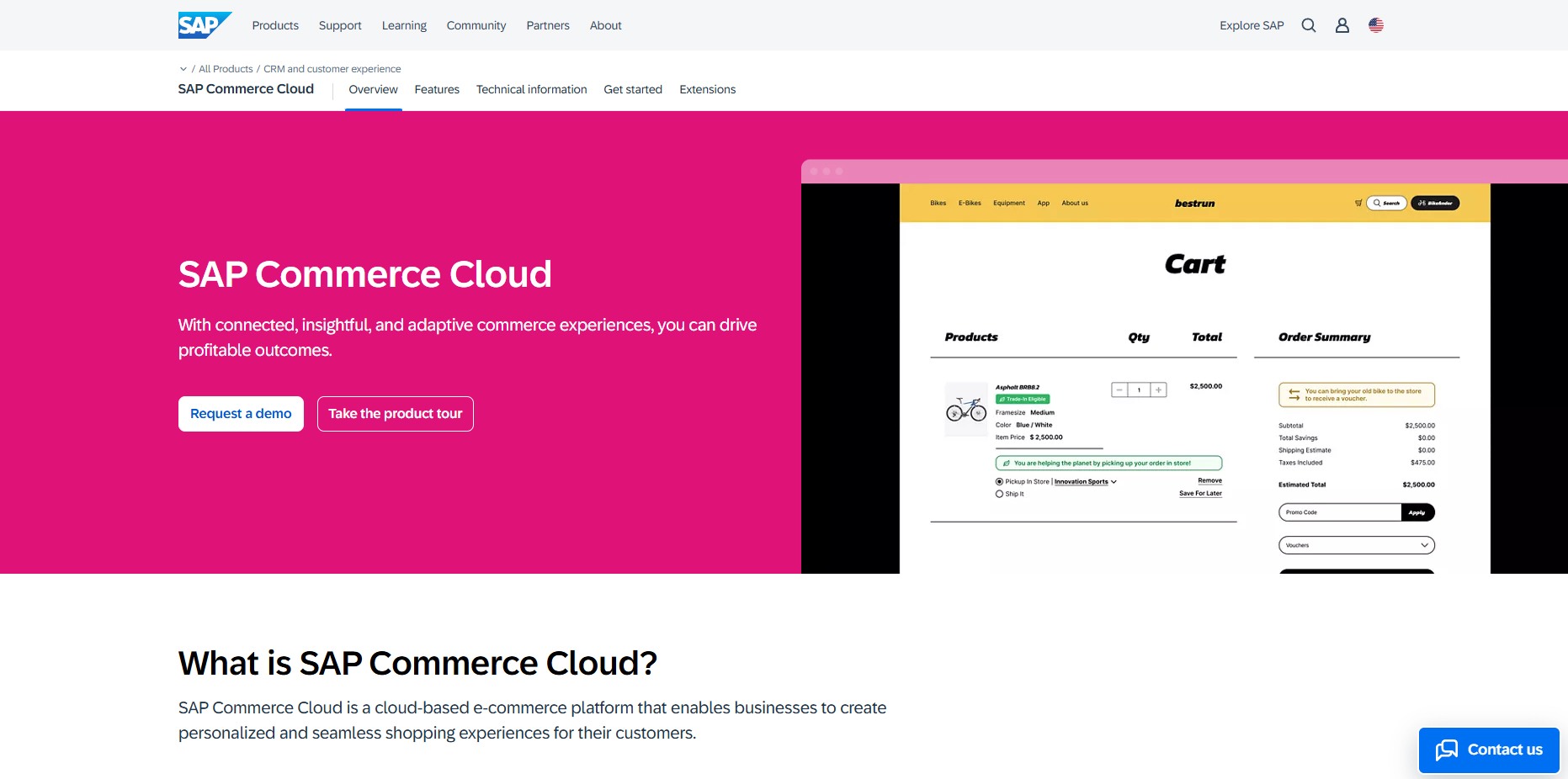
SAP Commerce Cloud is a powerful ecommerce platform for large enterprises. It caters to complex B2B, B2C, and B2B2C use cases. You can tailor the solution to fit your specific needs.
The platform allows you to manage complex catalogs, products, and configurations. This helps create personalized shopping experiences across different channels.
SAP Commerce Cloud offers a flexible and modular architecture. You can innovate and extend the platform using pre-integrated partner solutions. This lets you stay competitive and adapt to market changes quickly.
For B2B companies, SAP Commerce Cloud provides features tailored to the B2B purchasing cycle. You can manage multiple business models, channels, and markets on a single platform.
The solution combines standard ecommerce functionality with B2B-specific features. This creates a sophisticated, retail-like experience for business buyers.
| Pros | Cons |
| Customizable for specific needs | Mainly for large enterprises |
| Supports complex B2B, B2C, and B2B2C scenarios | May be complex for smaller businesses |
| Flexible and modular architecture | Requires technical expertise to fully utilize |
Prestashop for B2B
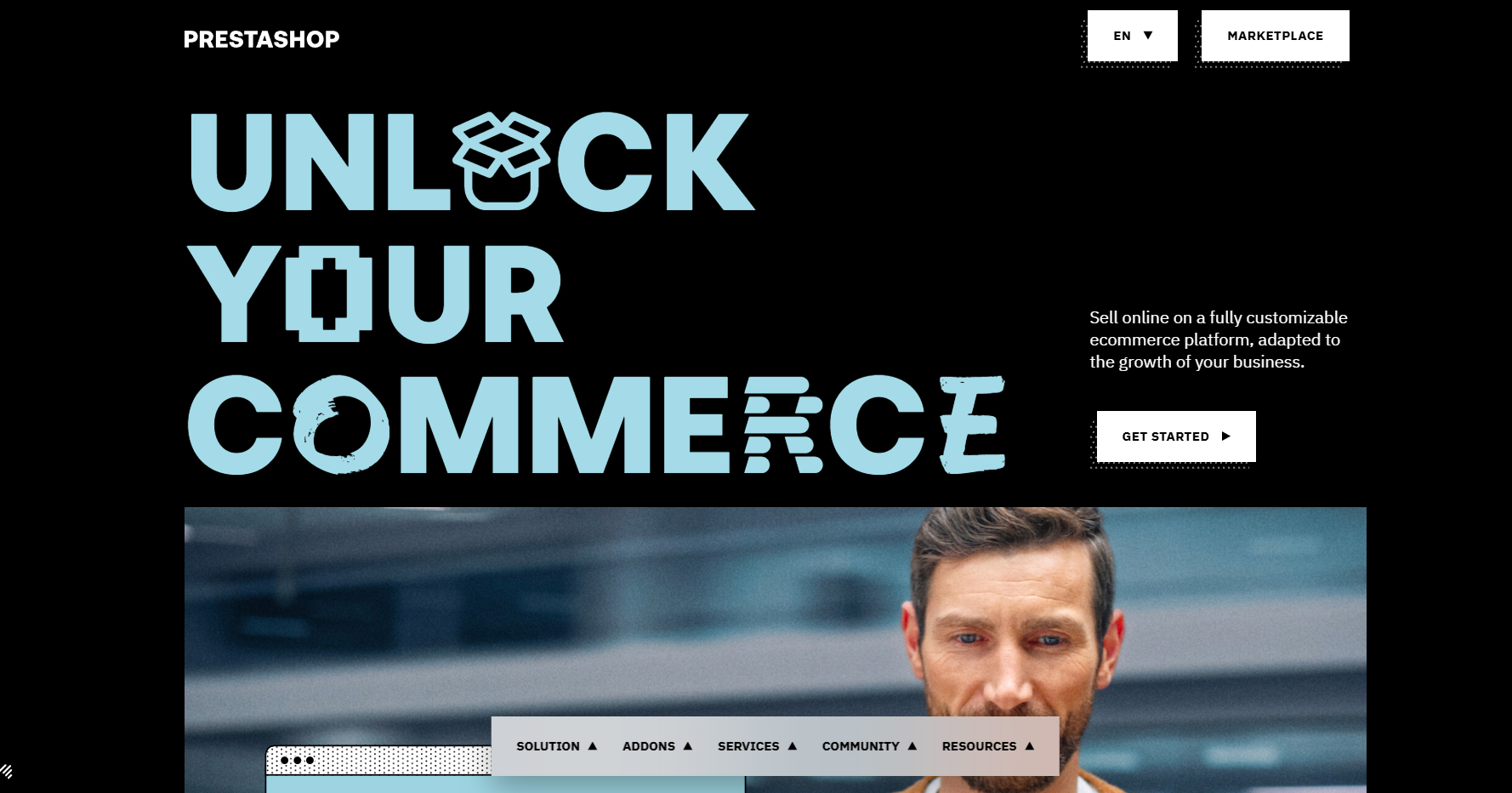
PrestaShop is an open-source ecommerce platform that can be used for B2B online stores. It offers many features to help businesses sell to other businesses.
You can customize PrestaShop to fit your B2B needs. It has modules and themes you can use to create a unique site for your company.
The platform lets you manage inventory, process orders, and handle customer accounts.
PrestaShop works for companies of all sizes. You can start small and grow your B2B store over time. The platform is flexible enough to adapt as your business changes.
One good thing about PrestaShop is that it’s free to download and use. You only pay for hosting and any extra features you want to add. This makes it budget-friendly for new B2B ventures.
| Pros | Cons |
| Free to use | Requires technical skills to set up |
| Highly customizable | Can be slow if not optimized |
| Good for growing businesses | Limited built-in B2B features |
PrestaShop may be a good choice if you want control over your B2B store and have some technical know-how. It’s best for companies that don’t mind putting in some work to create a tailored online shop.
Understanding B2B ecommerce platforms
B2B ecommerce platforms are online systems that help businesses sell products to other companies. These platforms have special business-to-business sales features, making it easier to manage large orders, complex pricing, and customer accounts.
Key features of B2B platforms
B2B ecommerce platforms come with tools designed for business sales. You’ll find features like custom catalogs, bulk ordering, and account management.
Custom pricing is a big part of B2B sales. These platforms let you set different prices for each customer or group.
You can offer volume discounts or special deals based on the buyer’s history.
Order management is also key. B2B platforms help track large, complex orders and can split shipments if needed. This keeps your inventory and shipping organized.
Many platforms also include quote tools. Buyers can request quotes for big orders, and you can respond quickly through the system.
Custom catalogs and pricing
B2B platforms let you create catalogs just for certain customers or groups. This means you can show different products or prices to different buyers.
You can set up tiered pricing based on order size or customer type. For example, a wholesaler might see lower prices than a small retailer.
The platform can also handle bulk discounts automatically. As order quantities go up, prices can adjust without you having to do it manually.
Some systems let customers see their specific negotiated prices when they log in. This makes ordering faster and reduces questions about pricing.
User roles and permissions
B2B platforms allow you to set up different user roles within a customer’s account. This helps control who can do what in the ordering process.
You might have roles like:
- Buyers who can add items to a cart
- Approvers who can review and approve orders
- Admins who can manage the account and see reports
You can decide which actions each role can take. For example, you might let buyers create orders but require an approver to submit them.
This feature helps your customers manage their purchasing process and prevents unauthorized buying.
User account dashboard
The account dashboard is where your B2B customers manage their relationship with you. It’s a central hub for all their account activities.
In a good B2B platform, the dashboard shows:
- Order history and status
- Invoices and payment info
- Saved carts or lists
- Account-specific catalogs and pricing
Customers can also usually update their info, add users, and set permissions from the dashboard.
Some platforms include analytics tools in the dashboard. These help your customers track their spending and find ways to save.
Benefits for businesses
B2B ecommerce platforms offer many advantages for both sellers and buyers. They can improve sales, speed up processes, and give customers more control.
For sellers, these platforms can open up new markets and make it easier to handle large accounts. They also reduce the workload on your sales team by automating many tasks.
Buyers benefit from 24/7 access to your products and their account info. They can place orders anytime, which is helpful for businesses in different time zones.
Both sides can save time and reduce errors with these digital tools. This often leads to stronger business relationships and more sales over time.
Increased sales
B2B ecommerce platforms can boost your sales in several ways. They make it easier for customers to buy from you, which often leads to more frequent orders.
With online catalogs, your full product range is always visible. Customers might discover items they didn’t know you offered.
Personalized recommendations based on order history can increase cross-selling. The platform might suggest related products or remind customers of items they often buy.
Many platforms also have tools for abandoned cart recovery. If a customer starts an order but doesn’t finish, the system can send a reminder. This can bring back sales that might have been lost.
Faster fulfillment
B2B platforms can speed up your order processing and shipping. When orders come in digitally, there’s less chance for errors from manual data entry.
Many platforms integrate with your inventory and shipping systems. This means orders can flow straight through to fulfillment without extra steps.
You can set up rules for order routing. For example, large orders might go to a specific warehouse, while rush orders get priority processing.
Customers can often track their orders right on the platform. This cuts down on customer service calls and keeps everyone informed.
Gives customers self-service abilities
Self-service features are a big plus for B2B buyers. They let customers handle many tasks on their own, without having to contact your team.
With a B2B platform, customers can:
- Check product availability
- Place orders at any time
- Reorder from past purchases
- Check order status
- Download invoices
- Update account details
This independence is great for customers who prefer to manage things themselves. It also frees up your staff to focus on more complex customer needs.
Self-service tools often lead to higher customer satisfaction. Buyers like getting information and placing orders quickly without waiting for responses.
| Pros | Cons |
| 24/7 access for customers | Can be complex to set up |
| Automated order processing | May require staff training |
| Custom pricing and catalogs | Initial cost can be high |
| Improved order accuracy | Needs ongoing maintenance |

Create your online store in minutes!
Looking to sell online? Develop and launch your store with 10Web AI Ecommerce Website Builder.
Choosing the right B2B ecommerce platform
Picking a B2B ecommerce platform is key for business success. You need to think about how it can grow with you, help you reach more customers, and work with your other tools.
Scalability considerations
Your B2B platform should be able to grow as your business does. Look for one that can handle more orders, products, and users without slowing down.
Check if it can support different pricing models and customer groups.
Think about your future needs. Can the platform add new features as you need them? Will it still work well if you expand to new markets?
A good B2B platform should also help you manage large catalogs and complex orders. This is important if you plan to offer many products or deal with bulk purchases.
Bigger reach
A good B2B platform helps you sell to more customers in more places. Look for features that make it easy to sell across borders.
This could include support for multiple languages and currencies.
Think about how the platform handles different time zones and shipping rules. Can it show the right prices and taxes for each country?
Also, check if the platform works well on all devices. Many B2B buyers now use phones and tablets to place orders. Your site should look good and work smoothly on all screens.
Expanded marketing opportunities
Your B2B platform should help you attract and keep customers. Look for built-in marketing tools.
These might include email campaigns, loyalty programs, or personalized product recommendations.
Check if the platform lets you create landing pages for different customer groups. Can you offer special deals or pricing to certain customers?
SEO tools are also important. Your platform should make it easy for potential customers to find you online. Look for tools that help you optimize your product pages and content.
Integration capabilities
Your B2B platform needs to work well with your other business tools. Look for one that can connect to your inventory system, accounting software, and CRM.
Check how easy it is to set up these connections.
Some platforms offer pre-built integrations, while others might need custom work.
Think about future needs, too. Can the platform connect to new tools as your business grows? Good API support is important for this.
Also, consider how the platform handles data flow between systems. You want accurate, up-to-date information across all your tools.
Building B2B ecommerce solutions with 10Web
For businesses looking to create a B2B ecommerce platform, 10Web offers a powerful suite of tools to build, customize, and optimize an online presence. The 10Web AI Website Builder 2.0 is especially suited for B2B ecommerce needs, allowing businesses to establish a professional online storefront that meets the specific demands of a B2B audience.
With this AI-driven platform, businesses can create websites quickly, integrating robust ecommerce capabilities through WooCommerce and scaling to meet the needs of bulk transactions, custom pricing, and tailored user experiences.
Key 10Web features for B2B ecommerce:
- AI-powered website creation: The AI Builder enables a section-based design approach, generating fully customizable websites without preset templates. Users can create a highly personalized website layout by simply providing key business details.
- Comprehensive store management: Manage orders, products, clients, taxes, shipping, and payment options from a single dashboard, making it easy to track B2B transactions.
- WooCommerce integration: Leverage the extensive capabilities of WooCommerce to set up custom pricing, manage inventory, offer bulk purchase options, and handle large orders seamlessly.
- Ultimate style customization: Adjust colors, fonts, and layouts for a polished and professional appearance that aligns with your brand’s identity.
- Advanced payment options and shipping customization: Offer flexible payment methods like PayPal, Stripe, and B2B-friendly options, and create custom shipping zones and rates to meet the needs of diverse business clients.
- Performance optimization with 10Web Booster: Enjoy faster load times, enhanced by Google Cloud hosting, boosting site performance and ensuring a smooth customer experience for B2B clients.
Getting started with 10Web’s AI Builder for a B2B ecommerce platform
- Sign up on 10Web: Visit 10Web and sign up for a free trial. You’ll start by entering your business type and details to help the AI understand your platform’s purpose.
- Provide business information: Describe your B2B business and select options related to ecommerce. Choose domain settings or add an existing domain to set up.
- Generate an outline: The AI Builder will create a structured outline for your homepage and other main sections. Customize the outline by adding or modifying sections like Product Catalog, Pricing, and Client Services.
- Customize your site’s appearance: Using the 10Web Editor, select fonts, colors, and styles tailored to your brand. You’ll also have access to premium widgets ideal for B2B ecommerce, like product filtering and search tools.
- Add and manage products: Use WooCommerce tools to add products, organize categories, and set up any unique B2B pricing structures or bulk options.
- Configure payments and shipping: Enable B2B-friendly payment methods and customize shipping options as per the requirements of your business clients.
- Publish your site: Review your ecommerce site’s layout and content, then publish it to launch. Use the 10Web Booster to ensure optimal site speed and performance.
10Web’s AI Website Builder 2.0 gives B2B businesses a seamless way to establish a comprehensive, optimized ecommerce presence that efficiently serves their business clients.
Examples of B2B ecommerce websites
Not all B2B ecommerce sites have the same needs. B2B-friendly sites tend to have functionalities like bulk ordering, account management, quotes, approvals, and more. Here are a few websites that exemplify the best of B2B ecommerce websites.
Ulta Beauty
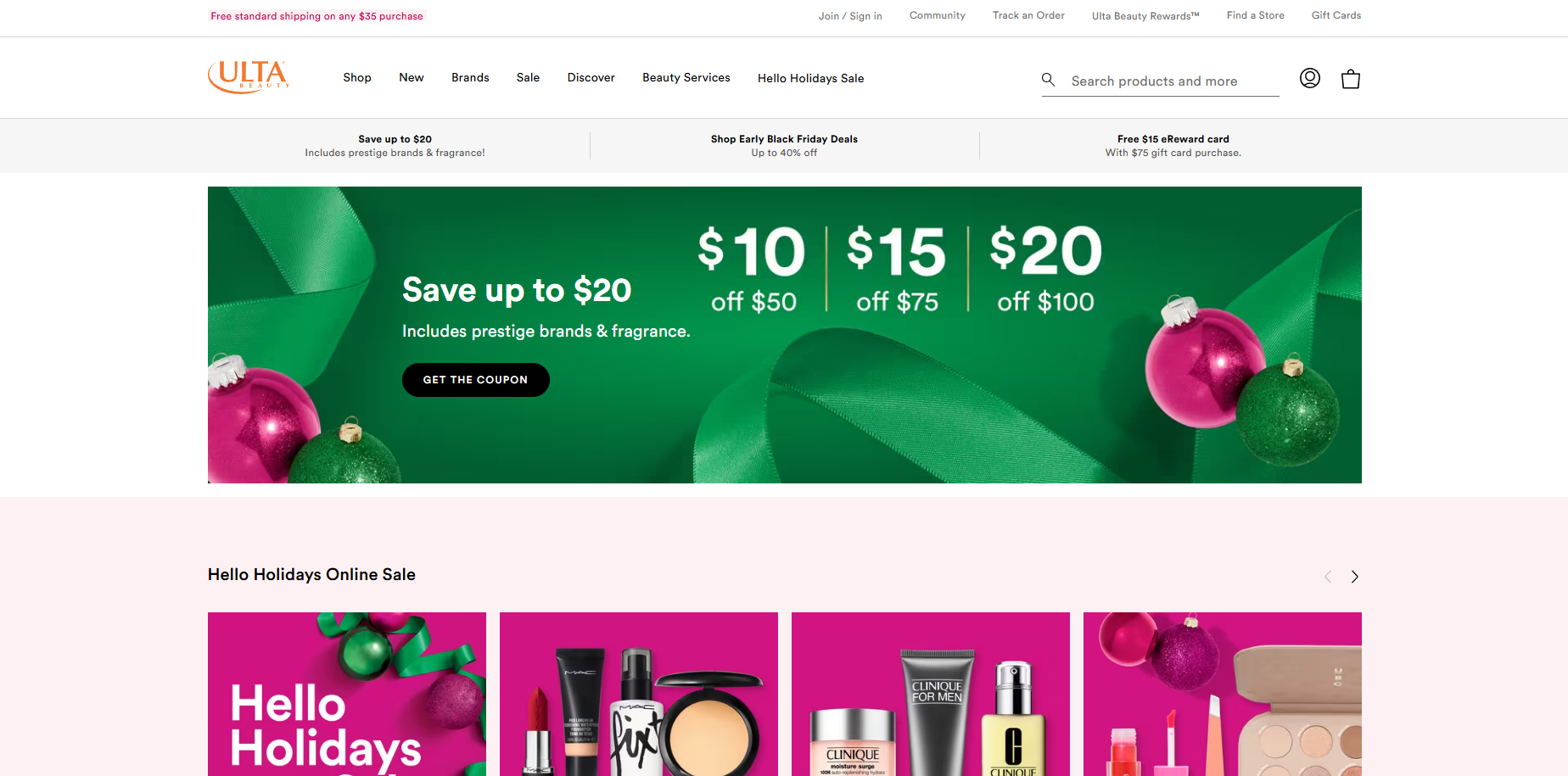
Ulta Beauty offers a top-notch B2B ecommerce platform for beauty product distributors. Their site features over 500 brands and 25,000 products, making it easy for businesses to find what they need.
You’ll appreciate the user-friendly navigation and simplified decision-making process.
Pros:
- Wide product selection
- Easy-to-use interface
Cons:
- May be overwhelming for small businesses
Picky Bars
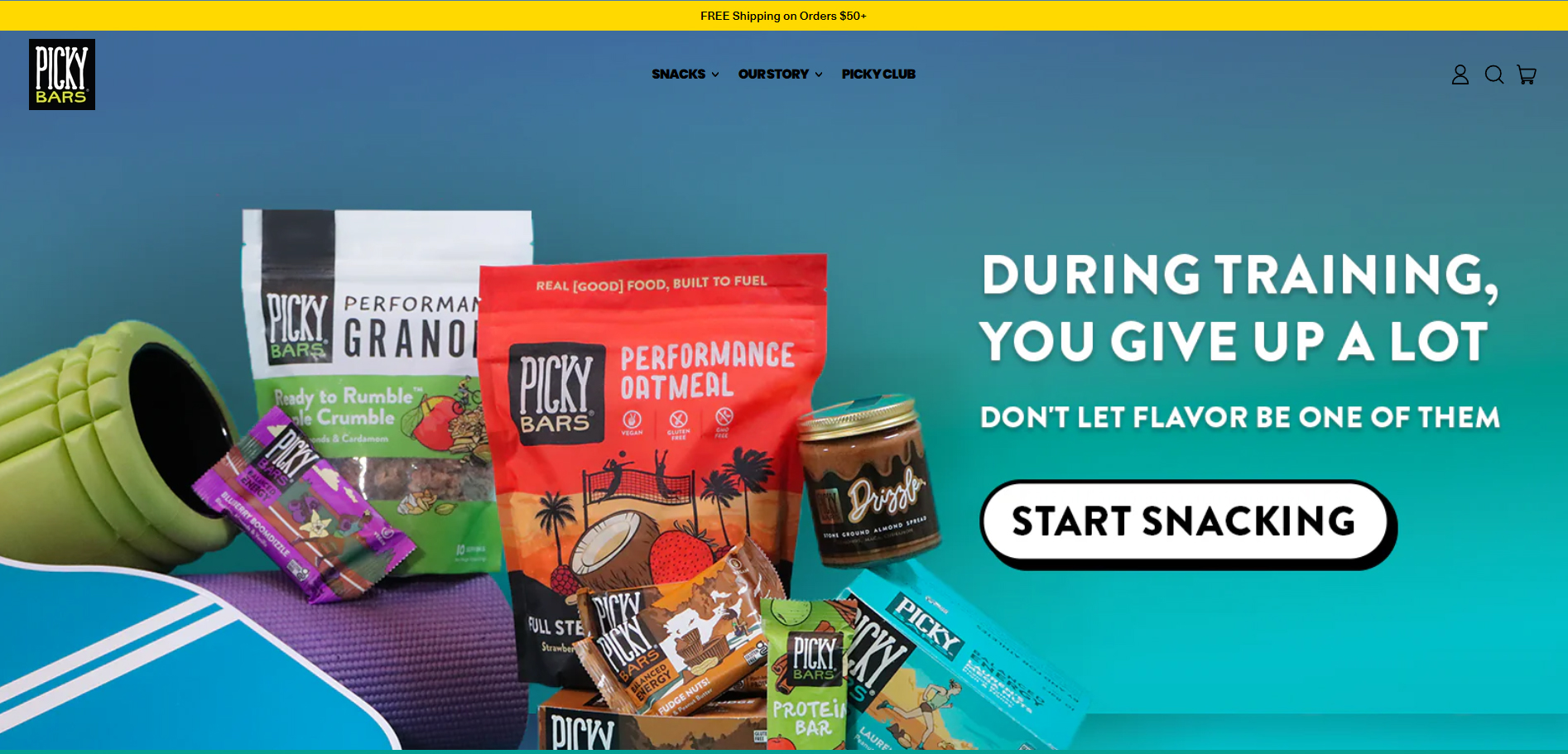
Picky Bars showcases a seamless B2B buying experience for health food retailers. Their platform allows you to quickly order custom protein bars and other healthy snacks.
You’ll find the ordering process straightforward and efficient.
Pros:
- Custom product options
- Quick ordering process
Cons:
- Limited product range
Price range: Low to mid
Best for: Health food stores and gyms
| Pros | Cons |
| Custom product options | Limited product range |
| Quick ordering process |
SwagUp
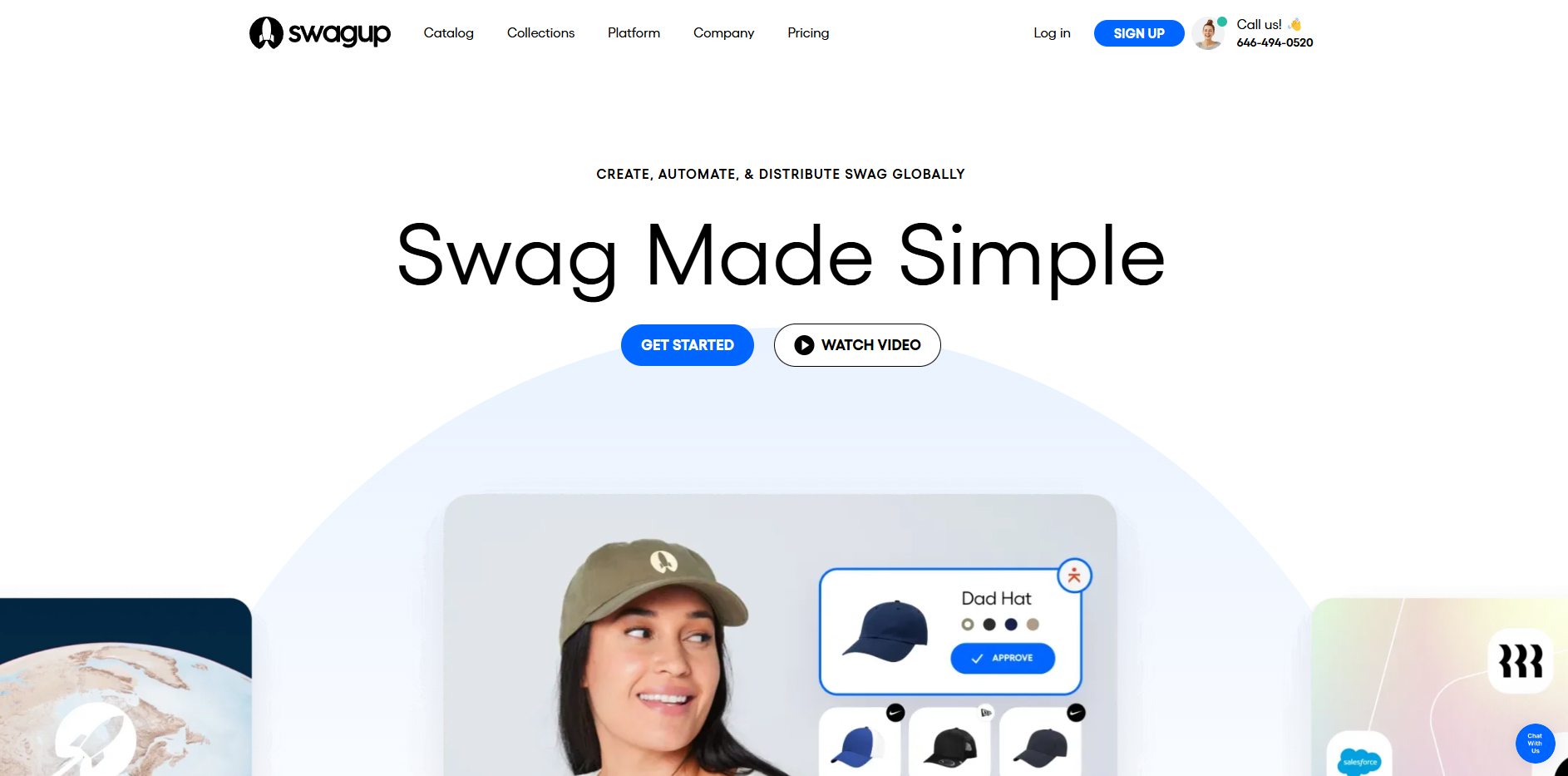
SwagUp provides a streamlined B2B ecommerce platform for branded merchandise. You can create and order custom swag in minutes, from start to checkout.
The site offers a wide range of customizable products for your business needs.
Pros:
- Fast customization process
- Wide variety of products
Cons:
- Minimum order quantities may be high
Price range: Mid to high
Best for: Companies looking for branded merchandise
| Pros | Cons |
| Fast customization process | Minimum order quantities may be high |
| Wide variety of products |
Conclusion
Choosing the best B2B ecommerce platform is important for businesses aiming to streamline their operations, reach more customers, and boost sales in today’s digital marketplace. By evaluating each platform’s unique features, scalability, and integration options, you can find the solution that fits your business needs—whether it’s managing bulk orders, handling custom pricing, or offering self-service options to your clients.
With the right B2B ecommerce platform in place, your business can deliver a seamless purchasing experience that drives growth and improves customer satisfaction. Explore these top platforms and empower your business to thrive in the competitive B2B landscape.
FAQ
What are the best platforms for businesses?
The best platforms for B2B businesses often include options like Shopify Plus, BigCommerce, Magento, and WooCommerce. These platforms are known for their scalability, flexibility, and robust features tailored to meet the needs of B2B transactions.
Which platforms support B2B transactions?
Many ecommerce platforms support B2B transactions, including Shopify Plus, Magento, and Salesforce Commerce Cloud. These platforms offer features like bulk pricing, customer segmentation, and advanced inventory management, which are essential for B2B operations.
What features should a B2B platform have?
A B2B ecommerce platform should have features such as bulk ordering, customizable pricing, customer account management, integration with ERP systems, and advanced analytics. These features help streamline the purchasing process and enhance customer experience.
How to choose a B2B ecommerce solution?
When choosing a B2B ecommerce solution, consider factors like scalability, ease of use, integration capabilities, pricing, and customer support. It’s also important to evaluate whether the platform can accommodate your specific business needs and growth plans.
What are popular examples of B2B platforms?
Some popular B2B ecommerce platforms include Salesforce Commerce Cloud and WooCommerce B2B. These platforms connect businesses with suppliers and manufacturers, facilitating bulk purchases and fostering business relationships.
Are there open-source options available?
Yes, there are several open-source B2B ecommerce platforms available, such as Magento Open Source and WooCommerce. These options allow businesses to customize their online stores and have greater control over their ecommerce operations.
What is the largest platform for B2B sales?
Alibaba is often considered the largest platform for B2B sales globally. It connects millions of buyers and suppliers, enabling businesses to engage in international trade and bulk purchasing.
How do B2B platforms differ from B2C?
B2B platforms differ from B2C platforms primarily in their target audience and transaction complexity. B2B transactions typically involve larger order volumes, longer sales cycles, and negotiations, whereas B2C transactions are usually more straightforward and focused on individual consumers.
What are the top B2B platforms globally?
Some of the top B2B platforms globally include Alibaba, Amazon Business, and Global Sources. These platforms are known for their extensive product listings, reliable supplier networks, and user-friendly interfaces.
How can a business benefit from B2B ecommerce?
A business can benefit from B2B ecommerce by expanding its market reach, reducing operational costs, streamlining order processing, and improving customer relationships. Additionally, it enables businesses to operate 24/7 and provides access to valuable data for better decision-making.

Create your online store in minutes!
Looking to sell online? Develop and launch your store with 10Web AI Ecommerce Website Builder.










